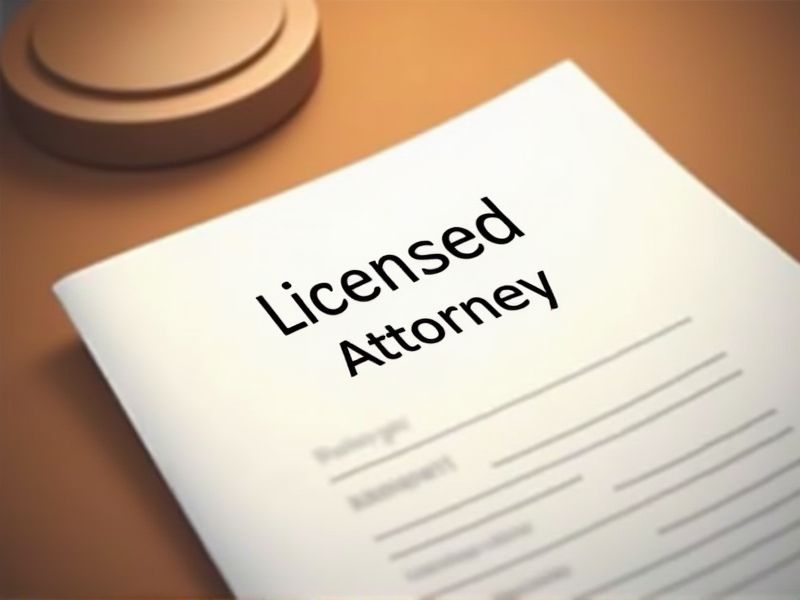
Licensed attorneys require certain certifications to enhance their credibility and stay compliant with evolving legal standards. These credentials ensure they possess specialized knowledge in diverse areas of law, which can be critical in representing clients effectively. Certifications also signal to potential clients and employers that the attorney is committed to continuous professional development. Here are some key certifications that may be necessary for a licensed attorney.
State Bar Admission Certification
State Bar Admission Certification ensures that attorneys meet the necessary educational and ethical standards. It regulates the legal profession, protecting the public from unqualified practitioners. Certification allows attorneys to represent clients in court within the state's jurisdiction. It reinforces the trust and integrity of the legal system by maintaining professional accountability.
Bar Exam Certification
Passing the Bar Exam is necessary for ensuring a lawyer has adequate knowledge of the law and legal procedures. Certification by the Bar ensures that legal professionals meet the minimum standards required to effectively represent clients. Most jurisdictions mandate Bar Exam certification as it acts as a regulatory seal of competence and ethical awareness in legal practice. Without this certification, an attorney cannot legally practice, which affects their career opportunities and trustworthiness among clients.
Patent Bar Certification
Patent Bar Certification enables licensed attorneys to specialize in patent law, a highly technical field that requires understanding the complexities of patent regulations and processes. Without this certification, attorneys may lack the authority to represent clients before the United States Patent and Trademark Office (USPTO), limiting their practice scope. The certification demonstrates a professional's competency in patent matters, providing credibility and trustworthiness in the eyes of potential clients. Attorneys with this certification can offer comprehensive legal services related to intellectual property protection, which can enhance career prospects and client base in a competitive market.
Certified Mediator
A certified mediator helps a licensed attorney resolve disputes amicably by facilitating communication between conflicting parties. This collaboration can often lead to faster resolutions, reducing the time and cost associated with prolonged litigation. Attorneys rely on mediators to create a neutral environment that encourages compromise and understanding. Utilizing a mediator can enhance an attorney's ability to achieve satisfactory outcomes while preserving professional relationships.
Certified Legal Investigator
A Certified Legal Investigator provides specialized skills in gathering and analyzing evidence that lawyers may not possess, thereby strengthening the case. Their expertise ensures that all investigative procedures align with legal standards, minimizing the risk of evidence dismissal. They offer insights that can guide attorneys in forming strategic decisions during litigation. Their presence alleviates some of the attorney's burden, allowing lawyers to focus more on constructing compelling legal arguments.
Certified Compliance & Ethics Professional (CCEP)
A Certified Compliance & Ethics Professional (CCEP) designation can enhance a licensed attorney's ability to navigate complex regulatory landscapes, ensuring adherence to laws and ethical standards. This certification equips attorneys with specialized knowledge in designing and implementing effective compliance programs, reducing the risk of legal infractions. Holding a CCEP can increase an attorney's credibility with clients and employers, as it demonstrates a commitment to upholding the highest ethical standards. Attorneys with a CCEP certification are often better positioned to advise organizations on mitigating legal risks, which can lead to more effective legal practices and client trust.
Legal Project Management Certification
Legal project management certification equips licensed attorneys with essential organizational skills, enhancing their ability to manage complex cases efficiently. It emphasizes a systematic approach to legal tasks, allowing for better allocation of resources and time management. Certification provides attorneys a competitive edge, setting them apart in a crowded field by showcasing their specialized capabilities. Clients increasingly demand cost-effective legal solutions, and this certification aligns attorneys with those market expectations.
Certified Paralegal Credential
While licensed attorneys can practice law independently, obtaining a Certified Paralegal Credential enhances their understanding of case management and procedural tasks. This credential helps attorneys become more efficient in delegating duties and overseeing paralegal staff effectively. Enhancing their paralegal knowledge can lead to better utilization of legal resources and more comprehensive client representation. The Certified Paralegal Credential is a signal to clients and employers that the attorney is dedicated to continuous improvement and excellence in legal service delivery.
Certified Privacy Professional (CIPP)
Privacy laws and regulations have become increasingly complex, necessitating specialized knowledge that legal education may not fully cover. A Certified Information Privacy Professional (CIPP) designation equips attorneys with the expertise to navigate these complexities, ensuring compliance and reducing the risk of penalties for their clients. As businesses face escalating scrutiny over data protection practices, attorneys with CIPP certification can offer a competitive edge by demonstrating proficiency in privacy law. The cross-disciplinary insights gained through this certification bolster an attorney's ability to provide comprehensive legal guidance in an era where privacy concerns are paramount.
Continuing Legal Education (CLE) Certificate Program
Staying updated with the latest changes in laws and regulations ensures that attorneys provide accurate legal advice to clients. Engaging in CLE programs enhances attorneys' professional competence and ethical performance, reducing the risk of malpractice. Legal education requirements encourage a culture of lifelong learning within the legal profession, fostering continuous intellectual growth. Compliance with mandatory CLE credits often represents a prerequisite for attorneys to maintain active bar membership and licensure in many jurisdictions.
Summary
You can enhance your credibility and marketability by obtaining additional certifications as a licensed attorney. With certifications, you often gain specialized knowledge that differentiates you from peers in competitive legal fields. This specialized expertise can lead to increased client trust and potentially higher rates for services. Certification may also open doors to more diverse career opportunities, expanding your professional growth and advancement prospects.
